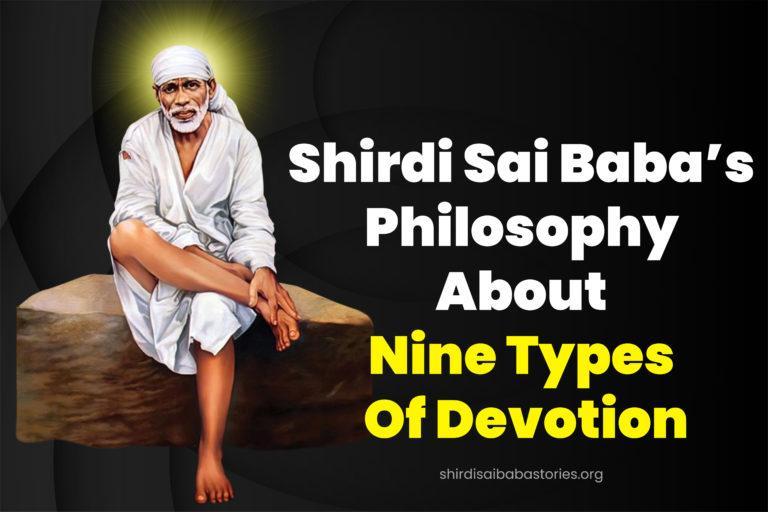
This story from the Sai Sarovar book is an inspiring example of the power of faith, patience, and virtuous living. It encourages us to focus on what truly matters in life and make the most of the time we have to achieve our spiritual goals. Though it an excerpt from the granth Sai Sarovar, i has been deemed suitable for inclusion in the Sai Prashnavali series and we invite you to read it and discover its timeless message for yourself.
It was December 1912, and the small village of Shirdi was bustling with excitement. On that Monday, the 30th of December, Saibaba had returned to Dwarkamai, His abode, from Lendi Bagh after meditation. As He made His way back, He was surrounded by a group of devoted followers, including Ganesh Krishnarao Khaparde, his son Balvant, Swami Hansdev, Nanasaheb Chandorkar, C. V. Vaidya, Trimbakrao Maruti, Madhavrao Deshpande, and many others.
Upon His arrival, the devotees took their seats in various places around Dwarkamai while the rhythmic sound of RadhaKrishnaMaai‘s bhajan was being heard in Dwarakamai. Even Mr. Natekar, who was in town that day, couldn’t resist the lure of RadhaKrishnaMaai’s bhajan, a beautiful hymn that was being sung by a group of devotees. Mr. Natekar made His way to RadhaKrishnaMaai’s cottage to listen to the enchanting music.
The sound of the bhajan was so mesmerizing that it could be heard throughout Dwarkamai. As the melody carried through the air, all of the devotees fell into a reverential silence. It was a beautiful moment, and it seemed as though time had stood still as everyone basked in the radiance of the music.
The atmosphere was still and quiet as Saibaba broke the silence with His melodious voice. “Once, I wandered to Aurangabad,” He began, “and came across a mosque with a tall tamarind tree in its center. There was a fakir named Matababa who lived there, and I asked him for permission to enter the mosque. At first, Matababa was reluctant to let Me enter. However, with some explanation and persuasion, Matababa eventually relented and gave Me shelter in the mosque”.
In the vicinity of the mosque lived an old lady who would give Matababa a piece of bread every day. This was his only sustenance, and he would spend his days eating that single piece of bread. Matababa never went out to the village to beg for food, so I proposed a solution to Matababa saying, “If you give Me permission to go to the village to beg for alms, I will collect enough for both you and Me to eat”.
Saibaba continued to beg for alms for the next twelve years, during which time He returned to the mosque where Matababa lived. When it was time for Saibaba to depart from the mosque, Matababa’s eyes filled with tears at the thought of his departure.
Saibaba reassured Matababa, “I will come back someday. I promise you that I will return. I never break any promise, and true to My word, See I returned to the mosque. In fact, I even gave Matababa a seat in the Chavdi as a sign of respect and reverence”.
Saibaba’s words held a special meaning and power that only He knew. They were like a secret language that could not be fully understood by His devotees, even if they tried to decipher it for seven lifetimes. But Saibaba’s kindness to His devotees was unrivaled, and His actions were reminiscent of the great Lord Ramchandra.
Just as Ramchandra stayed with Rakhmabai, tallied her karmas, lifted vessels on her behalf, and Ramchandra took Rakhmabai to a higher spiritual path. In the same manner, by begging for alms for the fakir Matababa, Saibaba helped Matababa to progress spiritually. He showed His devotees the importance of having faith and patience, often using parables to convey his message and the above one of Matababa was one of those parables.
As Saibaba spoke, the peaceful atmosphere was disrupted by the chirping of sparrows above the mosque. Madhavrao Deshpande, one of Saibaba’s devotees, pointed to the sparrows and asked, “Why have all these sparrows gathered here today?”
Saibaba’s reply was gentle and full of wisdom. “These sparrows were fortunate to have been born as sparrows in their previous lives, and they were lucky enough to have perched on the rooftop of this Dwarkamai,” He said. “But one day, a big snake climbed onto the rooftop and swallowed all the sparrows in one mouthful”.
Author’s Note: I think no snake can swallow all the sparrows in one mouthful, by snake Saibaba might be addressing Yamraj
Our interpreation on the above parable is “The sparrows represent us, the human beings. We live our lives on this earth, perched on the rooftop of our egos and desires. But just like the snake, death can come at any moment and swallow us whole. That is why we must always be mindful of our actions and strive to lead a virtuous life”.
The devotees listened intently to Saibaba’s words and were moved by His teachings. They realized that life is precious and that they must use it wisely to reach their spiritual goals.
Saibaba continued His story and said, “But seeing the virtues of these sparrows, Yumraj blessed them to be reborn as sparrows again. And not only that, they were born again on the holy land of Shirdi”.
Saibaba’s words held great meaning and power, and His devotees listened with rapt attention. The story of the sparrows was just one of many that Saibaba used to convey His teachings and enlighten His followers. His wisdom and compassion were known far and wide, and many came from all corners of the world to seek His blessings and guidance, then and now.
Saibaba’s teachings continue to inspire millions of people around the world, and His legacy lives on to this day. The story of the sparrows reminds us of the importance of virtue and the power of blessings. It also serves as a reminder that even the smallest creatures can hold great significance in the eyes of the divine.
Sai Baba concluded the story, “All the sparrows who used to live on the rooftop earlier have gathered together again here. All are very happy and to express their joy, they are making chir… chir… chir… chir… sound”.
Saibaba has unparalleled grace and compassion, resembling an endless ocean of forms and seas. He is considered the highest among saints, birthless, omnipresent, and all-knowing. With utmost reverence, I humbly bow my head at His lotus feet and offer my deepest salutations with folded hands.
List of Devotees of Sai Baba of Shirdi
© Shirdi Sai Baba Life Teachings and Stories – Member of SaiYugNetwork.com




Om Sai Ram🙏🏻🙏🏻🙏🏻🙏🏻🙏🏻🙏🏻🙏🏻🙏🏻🙏🏻💞
Very beautiful message! thanks for sharing gems from Holy book.
Love you Deva! Jai Sai Samarth!